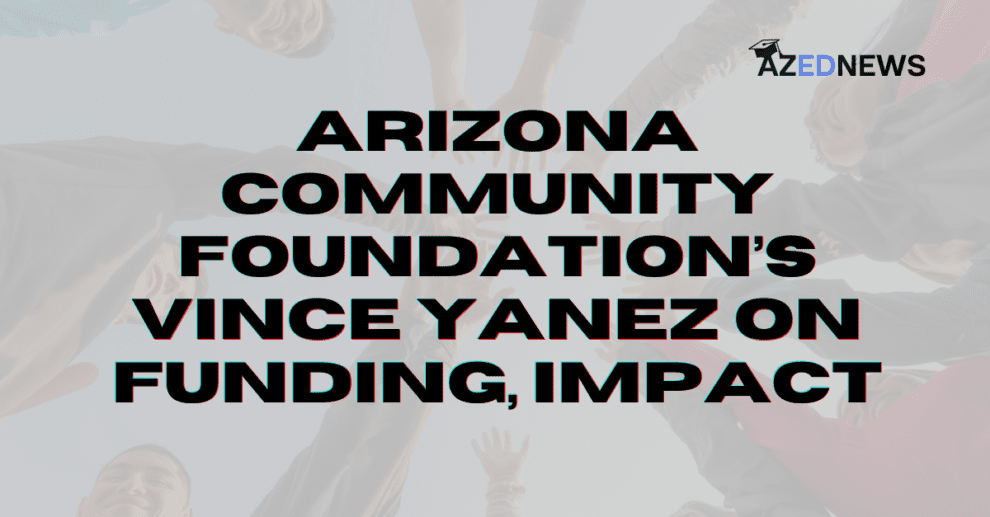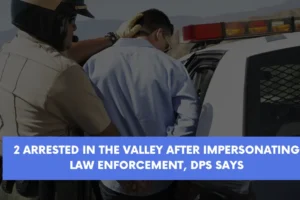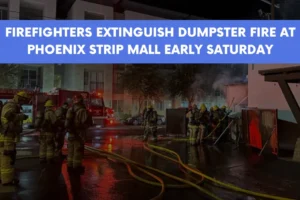Arizona Community Foundation’s Vince Yanez said policymakers need to create a comprehensive plan for funding Arizona education instead of responding to crises.
“We’re long overdue for a serious conversation about how we fund our schools – one that addresses the needs of the entire system,” Yanez said.
Arizona Community Foundation’s executive director of the Arizona Venture Fund for Quality Education Vince Yanez said policymakers need to create a comprehensive plan for funding Arizona education instead of responding to crises.
Yanez served as executive director for the Arizona State Board of Education from 2005 to November 2013 after rising through the ranks at the Arizona Department of Education. Yanez oversaw the board raising high school math and science graduation requirements, adopting new rigorous academic standards, the first state-level interventions in struggling schools, and the Move On When Reading initiative.
“There isn’t an education issue in Arizona where Vince doesn’t have intimate knowledge or background,” said Steve Seleznow, ACF’s president and CEO.
Yanez also served on Arizona Governor Jan Brewer’s P-20 Coordinating Council, the Arizona Ready Council Graduation Task Force, Arizona’s Race to the Top Panel, and the Expect More Arizona Advisory Council.
“Vince has distinguished himself as one of the most skilled and respected education leaders in Arizona and has masterfully built trust and credibility with state, local and elected officials, school district superintendents, school boards, community leaders, education advocates, and philanthropic leaders,” Seleznow said.
As executive director of the Arizona Venture Fund for Quality Education, Yanez now leads the Arizona Community Foundation’s education, scholarship and public policy initiatives, grantmaking, and continuing research.
Arizona Venture Fund for Quality Education, funded by the endowments of John and Delys Ellis and many more Arizonans, benefits students by investing in quality programs, innovation, reform initiatives and supporting scholarships.
Q: Which three areas of Arizona K-12 education would benefit most from increased funding and why?
A: For too long our policymakers have taken a piecemeal approach to funding our K-12 system – responding only to the critical needs of the moment. This isn’t a thoughtful approach to improving our schools, and it makes implementing the numerous education reforms enacted over the last several years incredibly difficult.
We all know the data. You can take your pick of metrics: kindergarten readiness, third-grade reading, eighth-grade math, SAT 10, AIMS, NAEP, SAT or ACT. Sadly, all of these measures show that our system isn’t allowing the vast majority of our students to reach their full potential.
I also recently read that according to the Auditor General, Arizona spent $412 less per student in 2013 than it did in 2009. Now, I’m not ignorant to the impact the recession had on our state, but divesting in our kids’ education isn’t acceptable. It’s particularly concerning when we take an honest look at the challenges we face.
So, I’d prefer not to call out just three areas that are in need of crisis funding. We’re long overdue for a serious conversation about how we fund our schools – one that addresses the needs of the entire system.
Q: How can private individuals, business and community groups help identify and expand the reach of promising K-12 education initiatives?
A: To a great extent this is an issue of civic engagement. Individuals and community groups need to become informed. We need to visit our schools, talk with our teachers, attend school board meetings, and ask questions to learn what works and what doesn’t.
Once we’re armed with that information, we need to let our school and elected leaders know what we expect.
At the same time, our businesses and the education establishments need to cooperate and demand that education be made a top priority for our policymakers. In the past year, we’ve seen very encouraging cooperative efforts with respect to Arizona’s College and Career Ready Standards.
Together, I think there is little doubt that business and education can move a statewide education agenda.
Q: What did you find most rewarding at the Arizona State Board of Education?
A: It was truly an honor to serve our state as the board’s executive director. Perhaps the most rewarding part of my time with the board was that it allowed me to meet and work with educators from around the state to help shape education policy. We have so many incredibly intelligent and dedicated teachers, administrators and governing board members in Arizona, and I was privileged to work with literally thousands of them during my tenure with the board.
Q: What are you looking forward to most at the Arizona Community Foundation?
A: I couldn’t be more excited about the work that lies ahead at the Arizona Community Foundation. I’m looking forward to finding new ways to work with our philanthropic partners, community organizations, the business community, government, private donors and – of course – our friends in the education community.
Q: You rose through the ranks to lead the Arizona State Board of Education through many reforms, and now you lead Arizona Community Foundation’s Arizona Venture Fund for Quality Education that funds a broad range of initiatives. What are your main focuses now and why?
A: Arizona Community Foundation’s Arizona Venture Fund for Quality Education is a philanthropic initiative to enhance the quality of education across our state. It’s a collaborative effort comprised of various ACF funds with total charitable assets exceeding $96 million.
During my time with the State Board of Education, I was fortunate to work with ACF on several occasions, and I’ve seen firsthand how its philanthropy can advance critically important education initiatives.
The Venture Fund will allow this work to continue and at the same time provide additional opportunities to engage in initiatives where we can have an even greater impact.
My focus is to cultivate these new opportunities and leverage our resources so that we can have a positive impact in classrooms and communities across our state. Our work can’t be limited to small programmatic investments.
I believe we have a responsibility to do everything we can to move our state in a positive direction.











